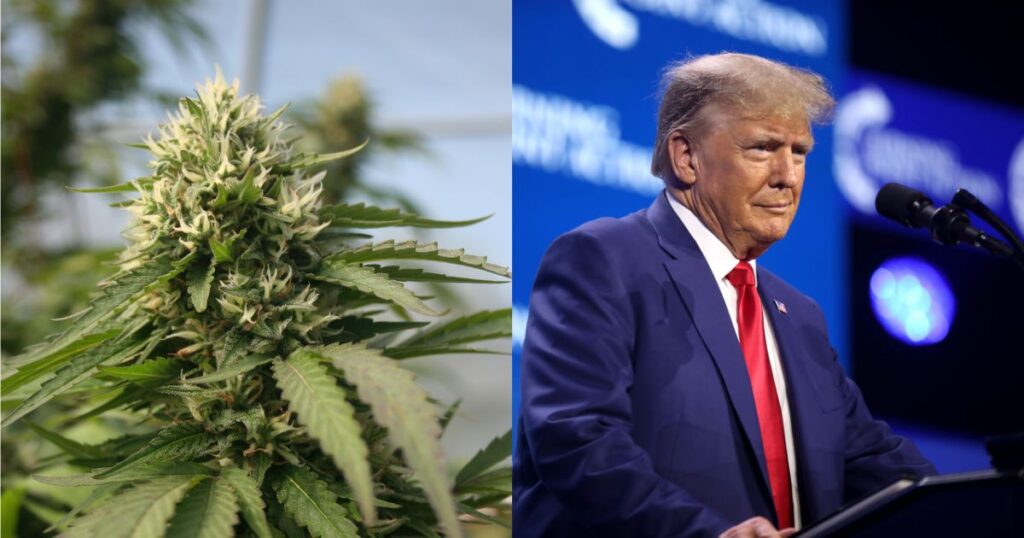Prominent sports personalities and entertainers are throwing their weight behind cannabis reform in a bid to push meaningful changes under Donald Trump’s leadership. A coalition featuring stars like Mike Tyson, Kevin Durant, Allen Iverson, and Ricky Williams recently addressed a letter to Trump advocating for cannabis reform.
Their demands focus on three crucial aspects: rescheduling marijuana, granting clemency to those imprisoned for cannabis-related offenses, and expanding financial access for cannabis businesses. What makes this initiative stand out is its strategic approach, which emphasizes Biden’s record—or lack thereof—on cannabis reform during his presidency while cleverly appealing to Trump’s competitive instincts.
The Coalitions’ Call for Leadership For Cannabis Reform
The newly formed “Coalition of Athletes and Entertainers Supporting President Trump’s Policy Objectives” emphasized the lack of progress on cannabis reform during Biden’s presidency, as first reported by Fox News. The letter argues that Biden failed to deliver on promises to address marijuana-related injustices, particularly regarding clemency for nonviolent offenders.
It pointedly recalls Trump’s decision to pardon music producer Weldon Angelos in his first presidency, whose cannabis-related imprisonment symbolized the injustices of federal drug policy. Their claim is clear and compelling: “Today, people continue to serve lengthy federal sentences for conduct now legal in most states, which makes their continued incarceration not only cruel but absurd.”
By framing Biden’s inaction as a missed opportunity for justice, the coalition is positioning Trump to emerge as a hero for the cause.
Rescheduling Marijuana as a Key Focus
A significant part of the coalition’s demands centers on the reclassification of marijuana. Cannabis is currently classified as a Schedule I drug alongside heroin, signifying a high potential for abuse and no recognized medical use under federal law. The coalition argues this classification is “scientifically outdated” and economically stifling for the cannabis industry.
Rescheduling marijuana to Schedule III would not only align federal law with evolving state policies but also encourage research, foster economic growth, and streamline regulations for cannabis businesses.
Mike Tyson, one of the driving forces behind this campaign, echoed these arguments during a Fox News interview. Tyson called the idea of cannabis being classified alongside heroin “ridiculous,” pointing to its acknowledged therapeutic benefits and disproven risks of serious dependency.
Banking Barriers and the Financial Toll of Prohibition
Another issue raised by the coalition is the lack of banking access for state-legal cannabis businesses. Despite the cannabis industry operating legally in 40 states, employing nearly half a million Americans, and generating over $30 billion annually, these businesses face significant financial hurdles.
The coalition’s letter explains how existing banking laws force cannabis companies to operate largely in cash, increasing security risks and administrative headaches. Beyond this, cannabis businesses cannot claim standard business deductions, which often results in prohibitively high effective tax rates.
Tyson and his coalition advocate for Trump to address these challenges, pushing for reforms that ensure fair economic opportunities for cannabis operators.
Why This Cannabis Reform Strategy Could Appeal to Trump
What makes this effort particularly notable is its strategic framing. The coalition is playing off Trump’s reputation for wanting to outshine his rivals by underscoring Biden’s shortcomings in this area. Marijuana reform is increasingly popular among voters across the political spectrum, with a vast majority backing sensible changes like rescheduling and clemency.
Even Trump’s base, which might have been lukewarm on cannabis in the past, is showing growing support for reforms that respect states’ rights and cut bureaucratic red tape. By presenting these reforms as an opportunity for Trump to demonstrate bold leadership, the coalition positions itself on politically advantageous ground.
Mike Tyson’s advocacy also comes with a personal investment. The retired boxer has been open about how cannabis has benefited his life, helping him manage personal struggles and improve his well-being. Tyson owns cannabis brand Tyson 2.0 and has made a name for himself as a vocal supporter of marijuana’s therapeutic potential.
During his recent Fox News appearance, Tyson highlighted not just the moral urgency but also the business case for reform. “It’s such a great income for the country,” Tyson said, pointing to the missed economic opportunities posed by outdated drug laws.
A Paradigm Shift for Cannabis Policy?
This coalition is looking to do more than just start a conversation; their end goal is meaningful policy change. By combining high-profile public appeals with targeted pressure on Trump’s administration, they’re hoping to set cannabis reform firmly on the political agenda. Whether or not this effort results in immediate action, it just shows the growing bipartisan demand for an updated federal approach to cannabis.
The coalition’s advocacy is symbolic of a larger shift in the dialogue surrounding cannabis reform. It’s no longer merely about the economic or societal benefits; now it’s framed as an issue of leadership and justice. The fact that figures like Tyson and Durant are stepping into this space signals its mainstream importance.
Whether Trump seizes this opportunity remains to be seen, but the coalition’s efforts are a reminder of the power of public figures leveraging their platforms for change. If nothing else, their campaign encourages renewed attention on a longstanding issue that impacts millions of Americans.
















